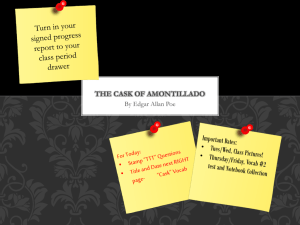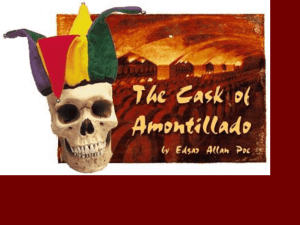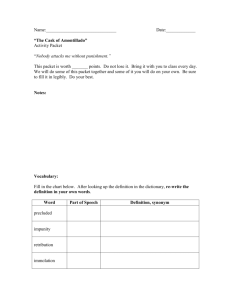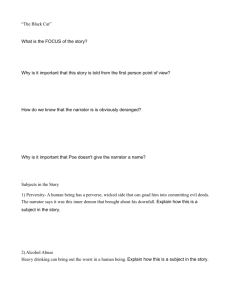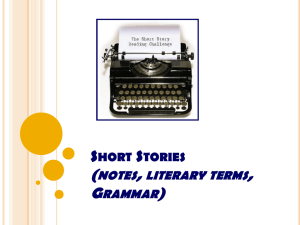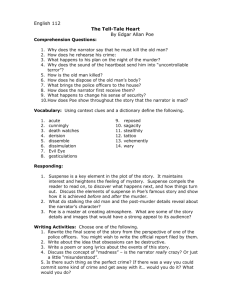The Cask of Amontillado
advertisement
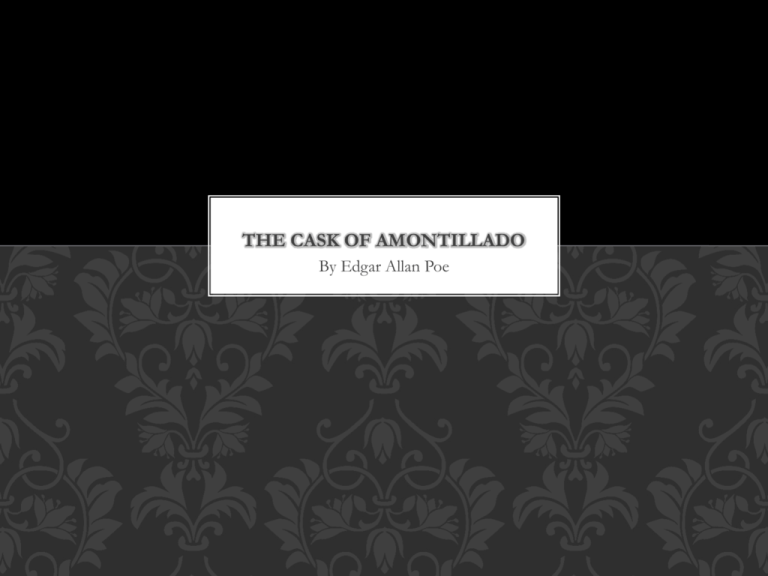
THE CASK OF AMONTILLADO By Edgar Allan Poe VOCABULARY: FOR A STAMP! 1. 2. 3. 4. 5. 6. 7. 8. preclude impunity immolation abscond repose termination subside aperture Write the word, part of speech, and a definition for each of the words on the left. Your Vocabulary #2 Exam will be on: • “Cask” words (8) • “Through the Tunnel” words (6) • Literary Terms (6) Test is on: Thursday/Friday, September 24-25 EDGAR ALLAN POE FUN FACTS Born: 1809, Boston, MA Died: 1849, Baltimore, MD (40 yrs. Old) Cause of death: unknown Married: Cousin Virginia (He was 27, she was 13…gross) Kicked out of West Point First writer to pursue writing as a career “Father of the Detective Story” Poe Bio Video REVENGE IS SWEET? QUICKWRITE 5-7 SENTENCES OPTION 1: Is revenge ever justified? If so, under what circumstances? What do you believe is the difference between revenge and justice? OPTION 2: Or, share a personal experience: Has anyone ever done anything to you that made you want to get revenge on them? What did they do? Have you ever gotten revenge on someone for something they did to you? What did you do to them in return? Why did you feel a need to get revenge? Explain how the revenge made you feel. Did you get caught? If you had gotten caught, would that have changed the feeling the revenge gave you? Explain. LITERARY TERMS: UNRELIABLE NARRATOR • An unreliable narrator is a character whose telling of the story is not completely accurate or credible due to problems with the character's mental state or maturity. • Provides the reader with inaccurate or incomplete information • May not know the whole truth or purposely deceives us WHAT CLUES US IN THAT THIS MIGHT NOT BE A RELIABLE NARRATOR? You’ll never believe what happened to me on my way to work this morning. I was minding my own business, driving in the middle lane of the highway, when some fool cut me off. His rear bumper was an inch from my car! I could’ve been killed! I dropped my cell phone and leaned on my horn. He ignored me like he’d done nothing wrong! So I switched lanes and sped up to pull alongside him. As soon as my car was even with his, I yelled out the window at him; again, he ignored me! I couldn’t believe it! WHAT TIPS US OFF HERE? The thousand injuries of Fortunato I had borne as I best could; but when he ventured upon insult, I vowed revenge. You, who so well know the nature of my soul, will not suppose, however, that I gave utterance to a threat. READ LIKE A DETECTIVE! To decide if Poe’s narrator is reliable, look closely at: • what the narrator says and does, and •what Fortunato, the narrator’s enemy says. • What details suggest that the narrator is unreliable— perhaps even insane. LITERARY TERMS: IRONY (RECAP) • A surprise! • It is the difference between what we expect to happen, and what actually does happen. • It is often used to add suspense and interest. • It is also used to keep the reader thinking about the theme of the story. THREE TYPES OF IRONY VERBAL The simplest kind of irony. You use it everyday when you say one thing and really mean another. It is often similar to a sarcastic response. Mean Girls A man looked out of the window to see the storm intensify. He turned to his friend and said “wonderful weather we’re having!” SITUATIONAL Occurs when a situation turns out to be the opposite of what you thought it would be. Well, isn't this ironic?! In “The Gift of Magi” by O. Henry, Della cuts her hair to sell it in order to have the money to buy her husband a pocket watch chain. Jim then sells the watch to buy Della hair combs. DRAMATIC Examples: Occurs when the audience knows something that the characters in the story, on the screen, or on the stage do not know. The audience is more aware of what’s going on than the people in the production. This is used to engage the audience and keep them actively involved in the storyline. In Star Wars, the audience knows that Darth Vader is Luke’s father, but Luke does not know until Episode V. In Toy Story, human characters are not aware that the toys speak and move while the audience is aware. MOOD The feeling or atmosphere that a writer creates for the reader. • Descriptive words, imagery and figurative language contribute to the mood Doris Lessing builds a suspenseful and anxious mood as Jerry is swimming through the tunnel. EXPLORE THE TITLE What is Amontillado? A type of Spanish wine (sherry) SETTING: CATACOMBS Catacombs are underground tunnels or rooms dug out as tombs or sometimes used for religious worship. SETTING: CARNIVAL/ITALY Mainly celebrated in Roman Catholic countries, such as Italy and France, carnival is an elaborate festival that occurs during the weeks before Lent, a holy season of abstinence and prayer. Mardi Gras in New Orleans stems from this religious tradition. How might you describe the mood of carnival? LET’S START READING: PAGE 372 “NEMO ME IMPUNE LACESSIT” Discuss what the image suggests about this “family” crest Identifying Irony: 1. What is ironic about Fortunato’s name? (V,S,D?) 2. What is ironic about the setting? (V,S, D?) 3. What is ironic about Montresor’s toast? (V,S,D?) 4. Find two other examples of irony, explain why they are ironic. Identify V,S, or D. Identify Imagery: Find three examples of imagery. Cite the line with the quote of state which sense they are appealing to. What type of mood do the examples you chose create? Explain your answer. THEME QUESTION: "Theme" can be defined as "a comment about the human condition that a writer makes through his or her work," and a theme or themes are often what make a work of literature relevant to all of our lives. Start with topics/subjects: 1. 2. 3. Can you identify one or more themes in "The Cask of Amontillado"? In other words, can you identify any general comments about life and the human condition that Poe is suggesting through the specifics of this story? Choose a topic. What is Poe’s message on that topic? Find three quotes to prove/support your claim. THEME
